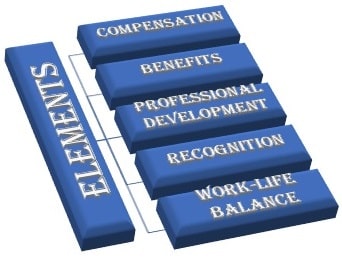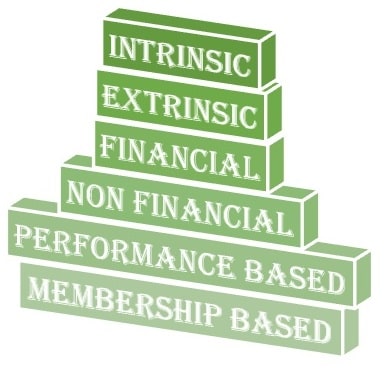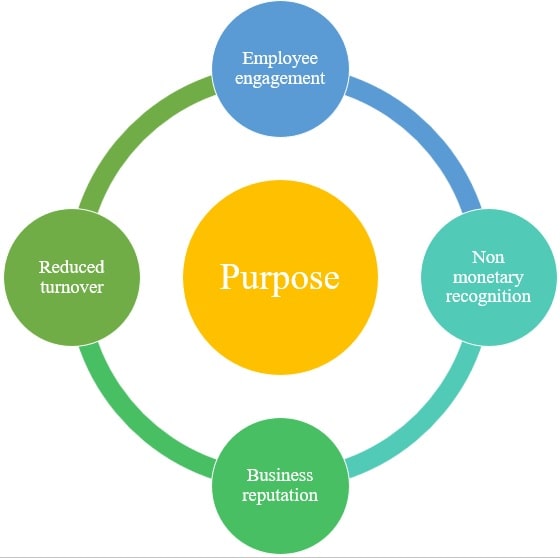Reward System Homework Help
Meaning of Reward system
Reward system is the set of strategies and policies formulated for the benefits of the employee that aims at rewarding the employees in the organization who performed exceptionally well in the organization which encourages them to maintain their efficiency.
Elements of the reward system

Reward system in total comprises of various elements or components. A reward system includes five elements:
- Compensation
- Benefits
- Professional development
- Recognition
- Work-life balance
Compensation
This is the first element of the reward system in every organization. Compensation of an employee includes the basic salary plus the bonus, profit, and incentives that the employee gets along with the basic monthly salary. For example, an employee has a basic monthly salary of US $ 20000 and the company is providing him the bonus of US $ 1000 for his incredible performance in the last month. This basic salary along with the amount of bonus will be considered as the compensation paid to the employee as a part of the reward system.
Benefits
Mandatory programs and employer options both forms the part of benefits given to the employee by the employer. Mandatory programs such as social security and employee’s compensation are the benefits that are compulsory for an employer to provide to his employees. Employer options are the benefits that are up to the employer whether to give such options to the employees or not. Employer options include paid vacation and pension programs.

Professional development
Professional development in the rewards system refers to the benefits that are provided by the employer to his employees for the enhancement of their knowledge and skill capabilities. Professional developments include the training that is being given to the employees for increasing their knowledge and skills, advancement opportunities for the growth of the employees which aids in the growth of the organization as well.
Recognition
Another component of the reward system is recognition. This is the best way for an employer to motivate his employee. The employee is recognized, appreciated, and praised for his excellent contribution to the organization’s growth due to his hard work and dedication in front of other employees. Prizes are also given to the employees for their hard work. The employee is highly motivated when recognized in front of others.
Work-life balance
The last component of the reward system is the work-life balance. The employers give time to their employees to do their personal works along with their professional work. For example, an employer gives time to their employees and permission to attend the school meetings of their children, etc.
Importance of the reward system
The reward systems are important for every business organization as they help in attracting the employees towards an organization. Reward systems also act as a great motivator for the employees of an organization because in order to receive some extra benefits the employee will do more hard work and do the work with full dedication and that comes only with the motivation. The other importance of the reward systems in the organization is that it helps in retaining the potential employees in the organization for a long time period.
Reasons for the importance of the reward system:
- Mutual benefits: the reward systems are mutually beneficial for the employee as well as the employer. The employee who gets the reward in return for his contribution to the organization will be more committed towards the work which increases the productivity of the employees in an organization and that in turn will help in the growth of the organization.
- Motivation: The reward systems act as a great motivator because when the employee is praised and recognized for his excellent work he feels motivated and his confidence boosts up.
- Absenteeism: absenteeism also reduces in the organization with the introduction of reward systems. In order to do more work to get the rewards and recognition, the employee will be regular in his work. He will decrease the number of his leave as he has clearly defined goals and objectives on the completion of which rewards can be obtained. So, without taking leaves, he will complete the tasks assigned to him.
- Loyalty: reward systems help in increasing loyalty amongst the employees. An employee who is rewarded will be happy working with the organization and remain loyal to the organization as he feels like a valued employee of the organization.
- Teamwork: reward system builds a team spirit within the employees in an organization as they want to complete the tasks on time without conflicts to ensure the
Characteristics of the reward system
There are some characteristics or features that a good rewarding system must possess:
- A person receiving the rewards must feel the importance of such rewards
- The rewards should be distributed among the employees fairly and equally without any discrimination on the basis of favoritism, gender, race, religion, etc.
- Rewards should be visible so that the employee can feel the importance of such rewards
- Different rewards must be given to the employees for different levels of performance. So, it makes the characteristics of the reward system as the reward systems are flexible
- Rewards should not be so expensive such that they can increase the expectation of the employees
Objectives of the reward system
There are some basic objectives of the reward system. These are as follows:
- Attraction and retention
It is found from various studies that the organizations that provide an effective reward system to its employee will tend to attract a number of employees, as an employee before making the career choice will look at the benefits that the organization is providing for the development of the employee. The organizations with better reward systems are likely to satisfy their employees to a great extent which helps in retaining the employees in the organization for a long period of time.
- Motivation for performance
Another objective of the reward system is to motivate the employees for better performance which aids in the growth of the organization. Reward systems help in motivating the employees for performance because when the employees are praised and recognized in front of others their self-confidence increases and they feel motivated.
- Create a positive organizational culture
This is a very crucial objective of the reward system. Reward system also enables to create a positive culture in the organization. When the employees are rewarded for their every exception performance in the organization and their contribution towards the growth and development of the organization, they develop a positive attitude towards the organization which helps in creating a positive organizational culture.
- Improvement of skill and knowledge
One of the elements of the reward system i.e. professional development is also one of the objectives of reward systems. The employer tries to imbibe more skills and knowledge into the employees through training and development, and various courses that are developed for skill enhancement of employees so that more productivity can be incorporated into the organization.
Types of reward system

- Intrinsic rewards
Intrinsic rewards are the type of reward in which the employee feels rewarded due to the satisfaction that he obtains from his job itself. Intrinsic rewards form the parts of self-actualization needs and esteem needs. These rewards are self-initiated which is the result of job satisfaction, completion of tasks effectively and efficiently, pride for the accomplishment of work, or feel contented on being the part of the team and the organization.
- Extrinsic rewards
Extrinsic benefits are the type of benefits that are being provided by the employer to an employee. These are the extra or the supplementary benefits that an employee receives along with the compensation due to his performance in the organization. Extrinsic rewards are capable of fulfilling the physiological and safety needs of the employee. These benefits may be either in monetary terms or other benefits that are nonmonetary and are given by management mainly most of the times.
- Financial rewards
Financial rewards are the type of rewards which are mainly important for the well-being of an employee. These rewards can be in the form of wages, bonuses, profits, incentives, and other monetary benefits in terms of pension plans, sick leaves, paid vacation, medical insurance, etc. which can be used to fulfill the material needs of the employee.
- Non-financial rewards
These types of rewards do not contribute to the financial well-being of the employees. Non-financial rewards are given for on the job development of the employees in the form of the improved infrastructure of the organization, improved parking spaces, lucrative job titles, business cards, etc. Non-financial reward systems make the job more attractive to the employees which motivate them to work more and increases their productivity as a result.
- Performance-based rewards
Performance-based rewards are the type of rewards which are given to employees on the basis of their actual performances in the organization. Rewards are different for the different performances because if the best performer is rewarded with the same reward as that of the least performer there will be no difference between the two performances and the best performer will lose his morale. So, performance-based rewards are given as per the performances of the employees.
- Membership based rewards
This is the type of reward systems that are given for being a member of the organization. These rewards are basically given to the employees for being a member of an organization for a long time. Membership can be on the basis of seniority in the organization, profit sharing, benefits, etc.
Advantages of the reward system
- Motivation
Reward systems were developed for the purpose of motivating the employees of the organization so that their productivity can be increased which led to the growth of an organization. Reward systems establish the goals for the employees that they have to achieve in order to get the rewards. Motivation helps in making the employee more productive which as a result helps in the growth of the company. Therefore, it is beneficial for both the employee and the employer.
- Increased earnings
The employee reward system is directly connected to the earnings of the employees. The more productive the employee is, the more rewards he can achieve. The rewards are distributed to the employee on the basis of their contribution to the growth of the organization. The more they contribute, the more contribution is being made by the employer for their rewards.
- Loyalty
When the rewards are being to the employees to the employees for their effective and efficient contribution to the organization, their level of satisfaction increases in the organization. This makes them loyal towards the organization as they feel valued while working in the organization and all their needs are taken care of by the employer. Loyal employee spread positive words about the organization and helps in attracting more people. This will result in the development of a positive attitude in the employees and eventually a positive organizational culture.
- Reduced turnover
one of the biggest advantages of the reward system is that it helps in the reduction of employee turnover. Reward systems help in satisfying the needs of the employee which helps the employer to retain the employees in the organization for a long period of time, thus reducing employee turnover. A more and more qualified professional can be attracted and retained in the organization through reward systems. This also reduces the cost to the employer that is incurred by him on hiring the new recruits whenever the previous employees leave the organization.
- Collaborative efforts
Employees in the organization work towards the achievement of goals of the team also. This helps in strengthening the relationship between the teams. The bond between the peers become strong and there is a relation of trust and confidence between the superiors and the subordinates.
Disadvantages of the reward system
- Increased costs
The biggest disadvantage of a reward system for the employer is the increase in the cost due to such a system. As the reward system consists of many different elements i.e. monetary compensation to employees, prizes, etc. which increases the cost incurred by the employer. These all benefits are given to the employees out of the business profits and if the number of performers in the organization is very large so a large number of gifts are required to reward all those employees which becomes difficult for the organization.
- Planning and execution
Reward system requires planning and execution process which is very time-consuming. In order to reward the employees on the basis of their actual work performances in the organization there arises a need to evaluate the performance of each and every employee to decide about the gift that is to be given to the employee. Different aspects of employee’s performance are needed to be studied before actually rewarding the employee.
- Lack of long-term benefits
The other disadvantage faced by the organization is the lack of long-term benefits. Monetary and nonmonetary both the rewards are not able to provide any benefits to the employees that can be retained for a long period of time. The benefits will be there for a specific period of time and fade soon. So the employee cannot be motivated for a long time with such rewards and they will not feel the benefits after a particular period. Only small term benefits can be provided to the employees through such reward systems.
- Motivation issues
Reward system raises the issue of motivation. The employee who has performed well in the organization in a particular will be rewarded, praised, and recognized in the organization and the one who does not perform well during that particular point in time will lose his morale and confidence which results in lack of motivation in other employees who are not rewarded.
- Expectations
The employee who is always the best performer and is rewarded for his or her performance starts expecting more from the organization. They expect similar gifts from the organization every time they perform well. If the gifts are not similar to what they were used to get earlier the feeling of dissonance begins to develop in the employees of the organization. That is why this system suffers a disadvantage.
- Bias
In case the rewards are not similar, there develops a feeling of biases amongst the employees. The employees will lose their morale in the feeling of favoritism towards the other employees which affects their performances and the productivity of the employees as well as organization decreases.
Purpose of the reward system

An employee reward system serves the following basic purposes:
- Employee engagement
Employee engagement is the basic purpose of the reward system. Reward system develops a sense of motivation and self-confidence in the employee. He finds himself the valued employee of the organization for which the organization shows care and take care of his needs and desire which increases the engagement of employee in the organization and boosts the morale of the employees. Reward system makes employees enthusiastic and encourages them to work effectively and efficiently.
- Non-monetary recognition
It has been proved from various researches or studies that the non-monetary recognitions are directly linked to the motivation of the employees. Non-monetary benefits are the rewards that help to motivate the employees to a great extent. When the employees are recognized and appreciated by the employer in front of all the employees of the organization their motivation increases to the next level.
- Business reputation
Reward systems also help in maintaining the reputation of the business. The employee who is satisfied with the best working conditions of the organization, stability, benefits, and consideration within the organization he will spread the words to others as well which helps in building the reputation of the business. A positive organizational culture where the needs of the employees are taken care of being able to build their reputation in the industry.
- Reduced turnover
Reward systems result in a satisfied and happy workforce which reduced the turnover rates and increases the retention rates of the employees in the organization. When the organization provides all the case as well as fringe benefits to their employees they will not think of leaving the organization as they feel satisfied. An employee leaves the organization when he is not satisfied with the organization due to lack of appreciations and recognition and he does not find himself as apart of the organization. These are the most common reasons for the employee leaving an organization. Due to the rewards and recognition, the employee can be retained into the organization for a long period of time.
Successful reward systems
There are different types of reward systems but the list of the most successful reward systems is as follows:
- Compensation
This is one of the most successful reward system like this the basic salary or the wages of an employee that he gets as a part of his fixed income and is required by the employee to fulfill his basic needs. Performance of an employee must be evaluated on the regular basis in order to ensure that he is being paid appropriately for his performance and his salary should be increased whenever there is a need for such appraisals.
- Benefits
Benefits are the other successful reward systems that are not directly paid to the employees. Such benefits are often referred to as extrinsic benefits. The employer provides these benefits to the employees of the organization in the form of health insurance, sick leaves, paid vacation, company car, company mobile phones, and entertainment expenses. In some cases, accommodation is also provided by the employer to the employees. These all benefits are not direct but actually forms the part of the attractive pay package offered by the employer to the employees of the organization.
- Recognition
Recognition satisfies the psychological needs of the employees and forms the part of intrinsic reward systems. Recognition provides more satisfaction to the employees because recognition is given to the best performers in front of their colleagues, peers, or team members. Recognition, praises, and appreciations are given to the employees who perform exceptionally well during a particular time period and are capable of meeting the expectations of their employers and provided the desired results as expected or sometimes even more than expected.
- Appreciation
Appreciation to the employees acts as a successful reward system because when employees are appreciated even for their small achievements that do not make any significant contribution to the organization, they feel motivated and finds themselves a part of the organization.

